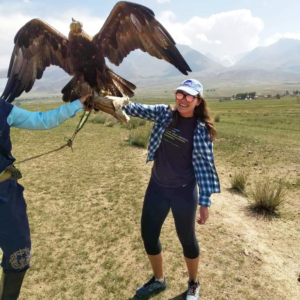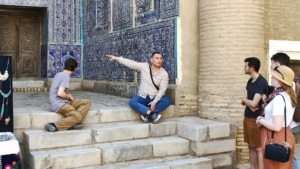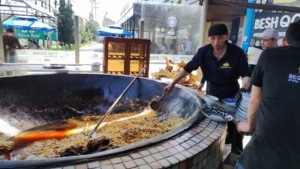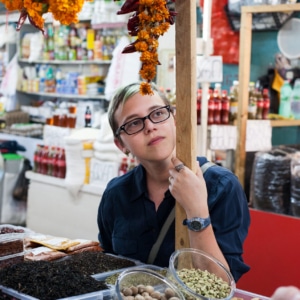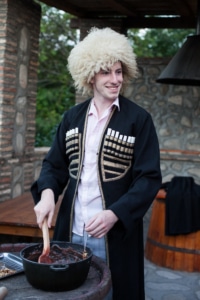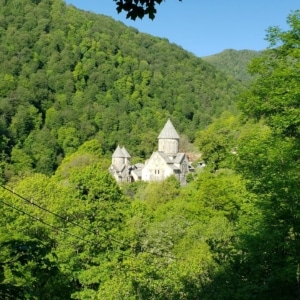Students seeking immersive Russian language study opportunities abroad saw the landscape shift abruptly in 2022. Both Russia and Ukraine, the most obvious and familiar locations, are no longer viable study abroad destinations and not likely to be in the near future.
There are still many excellent study opportunities to choose from, however. SRAS has been working hard these last few months to develop new programming in new locations. Below is a brief description of what we’ve recently added to our updated program search engine.
To Where Have We Expanded and Why?
In evaluating an immersion location, SRAS looks at three main criteria. First, we must find a quality partner that can provide intensive language instruction and responsive service for our students. Second, we look at the frequency with which the Russian language will be spoken in daily life outside the classroom. A third consideration is the degree to which Russian language will be similarly encountered in print.
Much of the progress that students achieve during their time abroad comes from using the language in daily life (active learning) and from hearing and seeing the language around them (passive learning).
Based on these criteria, we have focused our expansion on the Central Asian and Caucasus regions.
Central Asia as a Russian Immersion Location
Central Asian locations rate the highest for Russian immersion by our criteria. Russian is freely spoken on the streets and even most signage, advertisements, packaging, and even price tags in stores will be found in Russian or at least in Cyrillic.
While all Central Asian states have made great strides in supporting their native languages and local identities, they have also generally supported the continued study and use of Russian. With many economic ties to Russia, and with many Central Asians working in Russia and sending money home to support their families, Russian language has remained a strong and well-attended part of most Central Asian states’ educational curricula. See, for example, this recent article in The Diplomat.
While some pronouncements to move from Cyrillic to Latin alphabets have been made, most notably in Kazakhstan and Uzbekistan, implementation has been strikingly lackluster, resulting in a moderate mixing of Latin-alphabet signage while most text remains printed in Cyrillic. In fact, a similar mixing can be found inside Russia, where Latin has been introduced not by government decree, but by marketers hoping to make a business or product stand out as more stylish.
Thus, Central Asia provides a Russian language immersion most resembling what students would see in Russia or Ukraine.
SRAS has worked to expand the capacity of our Bishkek location, offering both Russian as a Foreign Language in Bishkek and Central Asian Studies as part of our long partnership with the London School of Languages and Cultures. We have added The Art and Architecture of Uzbekistan (Summer 2023), shorter study tours, and are working already on several faculty-led custom programs slated for 2023 and beyond. We are very excited about the many opportunities for study abroad in Uzbekistan.
Caucasus as a Russian Immersion Location
The Caucasus rank next by our criteria and also provide an amazing experience.
In the Caucasus, a striking rugged geography has helped create an extremely rich linguistic landscape. Because so many languages and dialects are spoken in these small countries, and because so many economic ties remain with nearby Russia, Russian has remained a lingua-franca for the region.
That said, educational policy has been more nuanced in the Caucasus. Georgia, for instance, canceled Russian courses, mandated English study, and ambitiously grew the English language programs of its public schools. Still, while knowledge of English has grown, Russian is still the strongest foreign language in Georgia. While most Georgians distrust Russia politically, they also see Russia as a strong and necessary economic partner. All of this means that Russian is still freely spoken on the streets, particularly in major cities such as Batumi and Tbilisi, which have long been frequented by large numbers of Russian tourists.
Armenia has maintained Russian as a strong component of its mandated public school curriculum. Russian remains, by far, the most spoken foreign language in Armenia and nearly every Armenian knows Russian to at least some extent. Speaking Russian in most daily interactions is still possible in Armenia.
While the spoken language is still strong, Georgia and Armenia both use their own unique alphabets to write their languages. Signage, price tags, etc. are most likely to be written in the local language in its unique alphabet. While some Russian text may be encountered, it is by far the exception, and competes on roughly equal grounds with English.
Based on the prevalence of spoken Russian, SRAS has partnered with strong institutions to offer new programs in the Caucasus. Our long-time partners at NovaMova (Kyiv) have relocated our former Kyiv programming to their centers for study abroad in Georgia. Russian as a Second Language in Batumi will be held during the summer (at the height of tourist season, when there are the most Russian speakers) and Russian as a Second Language in Tbilisi will held in fall and spring in in the Georgian capital. This shift is leading to what will likely be a longer-term adjustment to our Identity and Conflict in the Post-Soviet Space program, eventually splitting the program between Tbilisi and Kyiv once Kyiv can be safely reopened.
We are very excited to launch new programming for study abroad in Yerevan, Armenia with our partners at Armenian State Pedagogical University. We are already accepting applications for the summer 2023 Russian as a Second Language in Yerevan program there. Russian pedagogy programs are particularly strong in Armenia due to strong local demand for teachers. In addition to classroom instruction, SRAS students will be further supported by peer tutors from the ranks of the many students studying to teach Russian to foreigners. These conversation partners will bring students out of the classroom to explore the city and local culture.
A Word About the Baltics
We recognize that many students and faculty are looking closely at the Baltics for Russian language study. There are some excellent schools to consider there in this regard, with Daugavpils providing the most immersive experience as it is the center of a large and fairly homogenous Russian speaking area. At present, SRAS is developing support for faculty-led custom programming for the Baltics and researching future development of STEM programming there.
Conclusion
While the study abroad landscape is changing, there are still many great opportunities offering not only Russian language immersion, but also exposure to new countries and less studied cultures. SRAS has always developed programs around location, maximizing exposure to people, places, history, and culture. Students stay active with day and weekend trips, guest lectures, master classes, museum visits, and other immersive experiences.
Career opportunities requiring knowledge of Russian language and culture are not disappearing. Many new opportunities will appear in these new destinations and we can remain confident that continued study of Russian and experience abroad is very relevant.
We look forward to welcoming more students abroad to exciting, rewarding locations to boost their language skills, build their resumes, and widen their world views!


